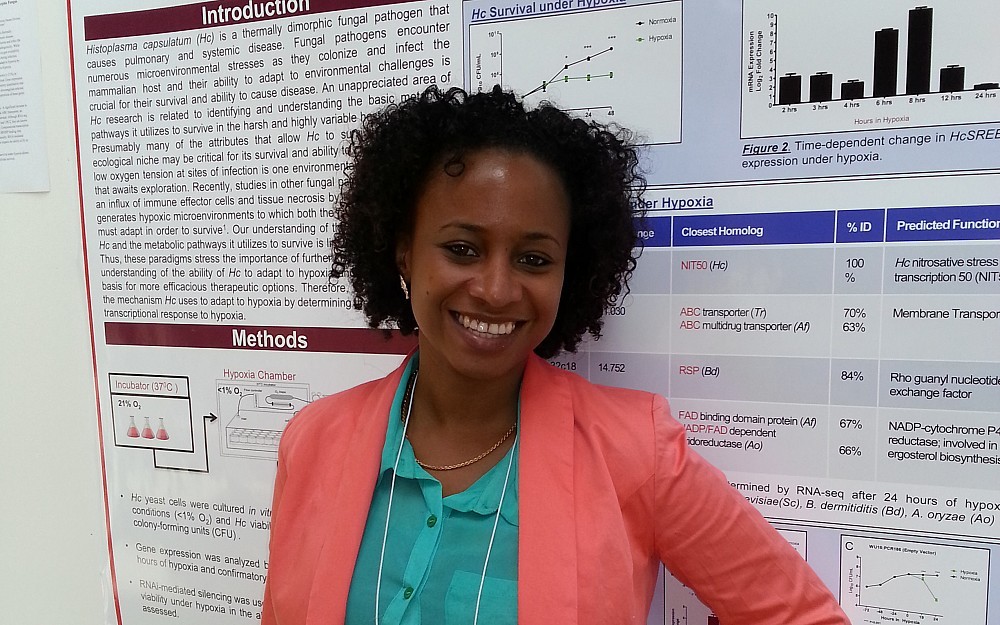
Focus on Students With Juwen DuBois
Pathobiology and Molecular Medicine student Juwen DuBois, 28, didnt always want to pursue a research career. The St. Lucian entered Grambling State University in Louisiana after moving to the U.S. in 2006 to pursue a bachelors degree in biology with the intent of continuing on to medical school. "However, by the time I was a junior, my interests shifted to research, and I decided to come to UC for a number of reasons, she says.
So, why UC and the Pathobiology and Molecular Medicine Graduate Program?
"Firstly, the close affiliation of the institution with private and local hospitals in the area affords students the opportunity to combine basic scientific studies with clinical applications. Secondly, the location of the campus is ideal because of the access to innumerable scientific collaborations at neighboring institutions. The diverse mix of academic pathologists, basic scientists and translational researchers reflects a commitment to bring scientists, clinicians and trainees together to create a thriving intellectual environment with an open exchange of new ideas. Finally, the PMM program itselfthe range of research conducted by the facultywas very appealing and because during my interview the graduate students felt like a close knit family.
You presented at the American Society for Microbiology Conference earlier this month. What was the subject of your research?
"My abstract was selected for a poster presentation at this years ASM general meeting in Denver May 18-21, and I was awarded an Outstanding Student Poster Award and the ASM Travel Award. My ASM poster was titled, "Transcriptional Response to Hypoxia in the Dimorphic Fungus Histoplasma capsulatum. Histoplasma capsulatum, or Hc, is a dimorphic fungus that is endemic in the Ohio and Mississippi Valley River regions of the U.S. and can cause pulmonary or systemic disease mainly in immuno-compromised individuals. Our understanding of the impact of low oxygen (hypoxia) on Hc and the metabolic pathways it utilizes to survive is limited. Therefore, our lab aims to determine the mechanism Hc uses to adapt to hypoxia by determining the significance of its transcriptional response to hypoxia. From our results we found a number of genes upregulated under hypoxia, and silencing of key genes led to impaired growth under hypoxia. Creation of Hc strains with impaired survival under hypoxia allows characterization of hypoxic adaptation and provides a sound basis for better therapeutic options.
What do you hope to eventually do with your degree?
"The incidence of life-threatening fungal infections has dramatically increased because of the rapidly growing population of immune-compromised individuals. As a result, the need for better therapeutics has created a need for increased research in the area of fungal pathogenesis. In the next few years, I hope to complete my PhD and secure a career in medical mycology.
What do you like to do in your spare time?
"In my spare time, I like to catch up with friends and participate in volunteer activities organized by various organizations.
Tags
Related Stories
Washington Post: The hour after leaving day care is a...
May 6, 2024
The Washington Post highlighted research led by University of Cincinnati and Cincinnati Children's Hospital researchers that found kids eat fewer healthy foods and take in 22 percent of their day’s added sugar intake in the single hour after they’re picked up from child care.
Local 12: Diabetes study focuses on how long blood sugar control...
May 3, 2024
The University of Cincinnati's Robert Cohen spoke with Local 12 about the GRADE study that shows how a new medication needs to be developed to help treat people with type two diabetes.
Local media cover $13.5 million gift benefiting ALS research and...
May 2, 2024
A historic $13.5 million gift from the estate of Hugh H. Hoffman will revolutionize amyotrophic lateral sclerosis (ALS) at the ALS Multidisciplinary Clinic at the University of Cincinnati Gardner Neuroscience Institute.
